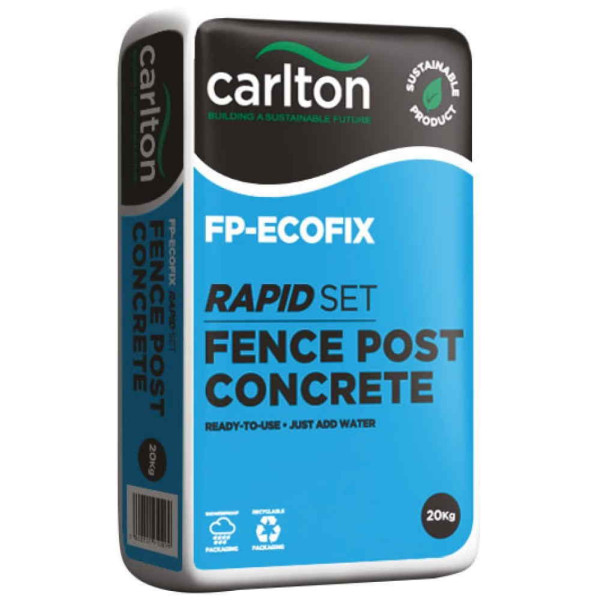Cement Products
Buy Cement Products for Solid, Repeatable Fence Foundations
Strong posts make straight fences. The quickest way to get there is with dependable cement products that set cleanly, cure predictably and stand up to British seasons. East Coast Fencing stocks bagged mixes and related materials that installers rely on for new boundaries, gate replacements and repair jobs—so you can set posts plumb, pour tidy haunching and move through a run at a professional pace. Order what you need today and enjoy free delivery on orders £99+.
Why foundations decide how your fence looks (and lasts)
Panels and rails only follow the lines that posts allow. If a footing moves, the skyline waves; if a hole holds water, decay accelerates. Good practice starts with a clean hole, a compacted granular base and a reliable mix that locks the post without slumping. With the right materials, you’ll spend less time chasing levels and more time enjoying a fence that stays quiet in wind.
Rapid-set vs traditional—choose to suit the job
Rapid-set post mixes are brilliant for long days: set posts plumb, add water per instructions, pour and tamp in lifts, then move to the next bay. Ideal for straight runs where pace matters. Traditional ballast/cement mixes give working time for complex haunching—corners, gate reveals and sloping plots—so you can shape shoulders and tidy tops. Both approaches benefit from a slight fall away from timber to shed rain rather than pool it.
Plan lengths, centres and embedment before you dig
Match your footing strategy to post length and exposure. Taller privacy fences and coastal corridors reward deeper embedment and wider holes—an easy insurance against winter gusts. Keep bay centres around the \~1.83m standard for panels; shorten slightly on very exposed sites to calm the line. Choose posts—wooden for warm, adjustable builds or concrete for maintenance-light straightness—then size footings to suit.
Set-out that speeds the pour
Mark the run with a taut string at the intended top height and another at rail datum. Dig to consistent depths, add a 100–150 mm granular base where soils are soft and check plumb in two directions as you pour. On sloping plots, decide early whether to step or rake; choose longer posts at step points to maintain embedment. Where hardstanding interrupts the line, bolt-down shoes can hold light screens, but for full-height privacy a concrete-in footing remains the gold standard.
Build the system above the ground as carefully as below
Once footings are set, protect the base of your cladding with gravel boards, then add your chosen fence panels—from robust closeboard to modern slatted and hit-and-miss designs for airflow. Finish with panel capping to shed water and align the skyline. At entrances, match posts with a sympathetic leaf from garden gates and hang with weather-smart hardware from ironmongery.
Haunching, finishes and tidy edges
Shape haunching so water and debris can’t sit against timber. Keep the top of each footing a little proud of surrounding soil with a fall away from the post, and avoid bridging mulch over the concrete—airflow is your friend. Along paths and lawns, a crisp edging between footing and surface makes maintenance easier and presentation sharper.
Cold weather, hot weather: pouring with the seasons
In low temperatures, protect fresh sets from freezing with insulation and avoid pouring onto ice or saturated holes. In hot spells, dampen the hole lightly so the mix doesn’t flash-dry against dust; keep bags shaded and mix in small batches. Always follow manufacturer guidance on curing times before loading posts with panels and gates.
Repairing rather than replacing? Do it right once
For a leaning post, excavate to the base of the existing footing and assess. If the hole was undersized or waterlogged, remake the foundation rather than bodging. When resetting in place, square up the slot height (for slotted concrete posts) to match your gravel board and panel stack, and pack level with compatible shims rather than improvised wedges that trap water.
Safety, handling and clean-up
Wear gloves and eye protection when handling cement; avoid breathing dust. Support posts while pouring, and secure the site until initial set. Rinse tools before the mix hardens and keep residue off paving and grass. Dispose of wash-out responsibly—cement is alkaline and shouldn’t enter drains or beds.
Confidence comes from the basics done well
Great fences start below ground. With dependable cement products, properly sized footings and a clear set-out, you’ll get straight lines, quiet panels and long service life from every run. Add mixes and accessories to your basket now—East Coast Fencing offers free delivery on orders £99+ so you can focus on the build, not the logistics.



